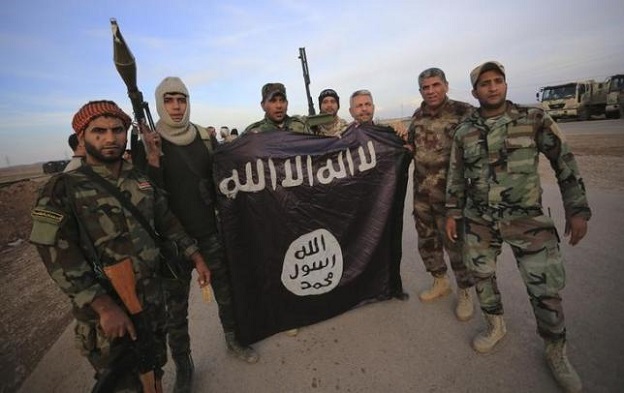
The murder of a 15-year-old teenager, thrown to his death by IS for being gay, not only reveals—yet again—the terror group’s murderous homophobia, but also the hypocrisy that exists alongside it.
A senior commander of the so-called Islamic State, named in reports as Abu Zaid al-Jazrawi, was having some kind of relationship with this as-yet-nameless 15-year-old, but the more senior man was not killed.
Instead, al-Jazrawi was reportedly flogged, and forced to leave Syria and join the fighting fronts in northwestern Iraq.
The boy, killed in Deir ez-Zor, Syria’s seventh-largest city, is not the first to be murdered in such a manner: the images of men, accused and suspected of being gay, being thrown to their deaths from tall buildings has become brutally familiar.
Trump accuses Obama of founding Islamic State
On Tuesday, the UK-based Syrian Observatory For Human Rights, told The Independent that at least 25 people have been killed by ISIS for being gay: six stoned, three shot in the head, and 16 thrown from high-rise buildings.
Of the 15-year-old’s killing, “The horrific execution took place in front of a large crowd,” a local media activist and an eyewitness told Syrian news agency ARA News.
“The boy was accused of being engaged in a homosexual relation with the prominent IS officer Abu Zaid al-Jazrawi,” media activist Sarai al-Din told the agency.
The Sharia Court in Deir ez-Zor reportedly said that Abu Zaid should, like the boy, die for being gay, but IS commanders demanded he be sent to fight in Iraq instead.
Subhi Nahas, a gay Syrian who escaped the country fearing for his life, and who in a history-making speech addressed the United Nations last year about LGBT persecution in Syria, told The Daily Beast that there were possible cultural reasons behind the murder of one young man and the reprieve of his older sexual partner, described as the teen’s “rapist” in some reports.
“A tradition in which adult males engaged in sexual pleasure with pre-pubescent boys--ghelman--including hermaphroditic boys, has existed before the creation of Islam," Nahas said. "Because these encounters didn't result in pregnancies, they became more commonplace after Islam had taken root."
The descriptions of the 15-year-old’s relationship with the commander are contradictory: It has been variously described as a “sexual relation” and “rape.” How consensual or coercive the relationship was is unclear, as is the nature of the relationship between the older and younger man.
Why Islamic State has been unable to enter Pakistan?
“Culturally, post the formation of Islam, people related homosexuality to pedophilia,” said Nahas, now an activist with the Organisation For Refuge, Asylum & Migration (ORAM). “No distinction is drawn between the two. If somebody raped a boy they called him a homosexual, not a pedophile. Maybe this commander had a kind of waiver given to him by his peers. They think, ‘He does great things for people. We cannot kill him, but we need a scapegoat, the boy.’
“They don’t call this relationship or [these] men ‘gay,’” said Nahas. “If a man has sex with another man, the two parties are the receptive one and the ‘inserter.’ If you’re the receptive party, you’re doomed. You’re seen as sodomized, someone has done this to you, you’re the abomination. If you’re the inserter, you are in control, you’re functional, you can reproduce.”
Nahas said the case was also puzzling: He had heard that while IS was sparing effeminate gay men “for the pleasure of older men,” the “masculine” men suspected of being gay were being killed.
In this case, it appeared to Nahas that the IS commander’s seniority possibly protected him. “They needed a scapegoat, they needed a boy to kill. There should be another part to this story, but people are not willing yet to give us any information because it’s very sensitive.”
Michael Luongo, editor of Gay Travels in the Muslim World, told The Daily Beast that the murder of the 15-year-old showed IS’s hypocrisy. “It goes to the idea that in some parts of the Middle East and other cultures being the penetrator is OK because that is not unmanly.”
Luongo added, “If the sex was with a 15-year-old boy I would be certain he was the one who was penetrated, who was raped. The hypocrisy would also be added to in that it would be started by the desires of the guy who was not harshly punished, by the commander.
“We have seen this type of hypocrisy in other so-called religious groups such as the Taliban. The horror is added to by the sense the 15-year-old was essentially raped and then murdered for his having been raped.”
Nahas told The Daily Beast that gay men joined IS to protect themselves and their families, sometimes reporting on fellow gays to conceal themselves more effectively. “Some new recruits report friends they used to have sex with, because they believe it’s the right thing to do.”
Nahas said that ORAM was still trying to establish the veracity of a website that appeared last year that purported to show members of ISIS engaged in gay sexual acts and poses.
The site, Nahas said, was established by an asylum seeker now in Europe, and while some of the photos had been Photoshopped, other details—men wearing a certain kind of camouflage and with ISIS flags in the background—suggested some of the pictures were real, “but people cannot confirm this because they are afraid. We do know of reports that gay people are in IS, or having sex with members of the militia.
“In doing so, they secure protection for themselves, and a safe haven for their families and—if they have them—their children. At the same time they can have sex in the background. They know they are protected. They are not investigated. Now the message of this latest incident is, ‘If you are senior enough with us and having gay sex, you will not be executed.’”
Speaking for ORAM—founded in 2008 as “the only international organization devoted solely to advocating for lesbian, gay, bisexual, transgender, and intersex (LGBTI) refugees fleeing brutalisation due to sexual orientation or gender identity”—Nahas said Syria remained “very dangerous” for gays.
“We hear from people within Syria looking for any way they can get out, or find a way to get resettled. They are too afraid to report what is going on. Lots are being kidnapped, lots are being killed. They are either scared for their life, or have no idea what to do to escape and how to do it.”
Nahas emphasized that the danger to LGBT people in Syria did not just come from ISIS, but from the government, and other groups—extreme and not.
Another militant Islamic group, Ahrar ash-Sham, also targeted gays—and a third group, which Nahas called the Judicial Court in Aleppo, executed seven people accused of being gay and of being drug users, by shooting them in their heads. The group also killed a 17-year-old boy, accused of being gay.
“The targeting of gay people in Syria is escalating, even by groups who say they are secular,” said Nahas. “They believe that gay people are one of the main reasons there is war in Syria, and they need to be killed so the war can be won.”
In rare admission, Pakistan recognises growing presence of Islamic State
Just as the 15-year-old in the most recent killing might have been a scapegoat, so are LGBTs being treated as such more generally.
Nahas said he knew of between 100 and 125 LGBT Syrians in Turkey, awaiting resettlement abroad, as he himself eventually secured last year after a perilous and terrifying escape from Syria.
Of watching the unfolding events for LGBT people in his home country, Nahas, who now lives in the US, said, “It’s devastating. You feel paralyzed. You feel like you cannot do anything. And you feel like, ‘How and why is this happening and what led to it?’ You cannot do anything about it, and I need to do something and want to do something, but there’s nothing I can do.
“I always put myself in their shoes and always think, ‘That could be me, that could have been me at any moment.’ There are not enough resources, and gays are afraid and scared, and they’re being targeted and killed.” Nahas paused. “It’s just too much.”























COMMENTS (1)
Comments are moderated and generally will be posted if they are on-topic and not abusive.
For more information, please see our Comments FAQ